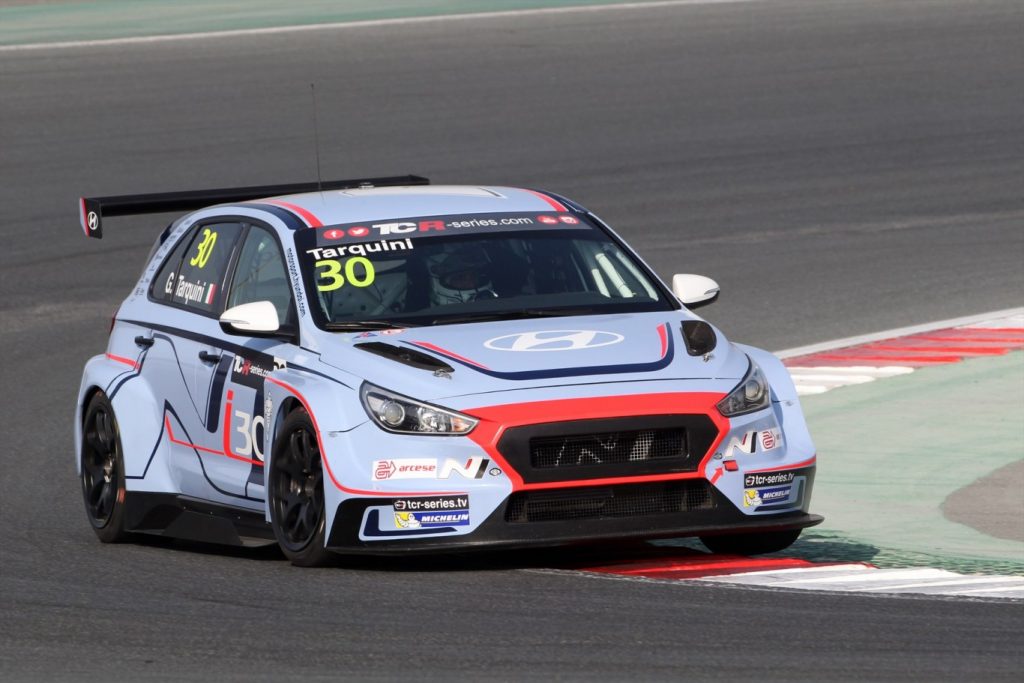Hyundai’s ambitions to expand its successful motorsports program into circuit racing for 2018 have taken a step forward, after a successful test outing for its new i30 N TCR track racer during the final round of the TCR International Series in Dubai.
Hyundai ran two i30 N TCR cars during qualifying at Dubai on 18 November as part of its development program, driven by Gabriele Tarquini and Alain Menu. The i30 N TCR is Hyundai’s first circuit racer, and can now be bought by privateer racers or racing teams, alongside the i20 R5 rally car, which was made available to privateer rally racers earlier this year.
Although the i30 N TCR cars were ineligible to progress to the final part of qualifying in the final round of the TCR International Racing series in Dubai – due to them not yet fully homologated for competition – both proved to be highly competitive. In the opening segment of the session both drivers held provisional pole, setting the second and fourth fastest times, Tarquini ahead of Menu, and at one point Tarquini blazed his way to the fastest lap.
The successful performance in Dubai followed previous impressive debut race during October at Zhejiang Circuit in China, which was won by Tarquini, and at Adria in Italy.
“Gabriele and Alain have again shown how competitive the i30 N TCR is in the strongest current TCR championship,” said Andrea Adamo, Hyundai Motorsport customer racing manager. “The car is clearly the fastest in the series at the moment. We have raced on three circuits now, and been at the front in all of them. The i30 N TCR will be at the front of any TCR series next season with our customers.”
Introduced for the start of 2015, the TCR Regulations are designed to create a highly competitive class of touring car racing, but where costs are tightly controlled. After three years, the regulations are used in a large and growing number of national and international championships. However, TCR racing is only open to privateer entries, not to factory teams.
Based on four- and five-door road-going models, TCR cars are front-wheel drive, powered by a two-litre turbocharged engine, which must be derived from a unit available in the manufacturer’s range, and equipped with a six-speed sequential gearbox. Limited modification to a base road car’s aerodynamics, such as the widening of wheel arches or the addition of cooling vents, is allowed. However, the most obvious aerodynamic devices on the car, the rear wing and front splitter, must be kept to a standard design mandated by regulations.
Hyundai started taking orders for the i30 N TCR early in November, and its development is the next step in an ambitious motorsports program.
“As our first project designed for circuit racing, the i30 N TCR is a very important step for Hyundai Motorsport,” said Michel Nandan, Hyundai Motorsport team principal. “The regulations have proven incredibly successful, with a growing number of series around the world embracing the category.”
The carmaker is already making a serious impression on the World Rally Championship, since re-entering the top level of rallying in 2014, securing a second-place finish for both the manufacturers’ and drivers’ championships in 2016 and 2017 with the Hyundai i20 Coupe WRC.
This year it has added depth to its rallying credentials, offering privateer buyers a “customer” i20 rally car homologated for the FIA’s R5 regulations. The i20 R5 is eligible for the WRC-2 support series, as well as for a range of national and regional rally championships worldwide, and was very successful in Europe during 2017. As with TCR, the R5 rally cars use a high proportion of standard production components to control costs.
“With the New Generation i20 R5 we made the step to begin building cars for privateer teams to purchase and run, and we will prove that we can develop and deliver a strong package,” said Nandan. “The production of a car for circuit racing was a big challenge, however, the strength of the TCR category makes the i30 N TCR the ideal platform to expand our Customer Racing commitments, and continue the work begun by the i20 R5, increasing Hyundai’s role in motorsport.”
Strong performances for the customer cars mean they are likely to find their way into more regional competitions. R5 regulations apply to new cars in the African Rally Championship and Middle East Rally Championship, while the four-event TCR Middle East Series launched in 2017, and returns for a second season early in 2018.
“With the customer cars, we are making a real commitment to motorsport, to the dedicated competitors and fans, and we are sharing in their passion,” said Mike Song, Hyundai’s Head of Operations for Africa and the Middle East. “It is very exciting for us to be competing so strongly in the World Rally Championship. With the Hyundai i20 R5 and the i30 N TCR we bring that excitement closer to home, supporting private drivers in local and national motorsport, and we can be very sure of seeing Hyundai take its place in motorsport in our region.”
As well as rally and racing cars, Hyundai has also launched its new N range of high-performance road cars. The first of the new range, the i30 N, was unveiled during the Frankfurt Motor Show in September, and is earning a highly favorable response as a true drivers’ car engineered to excite dedicated motoring enthusiasts.
